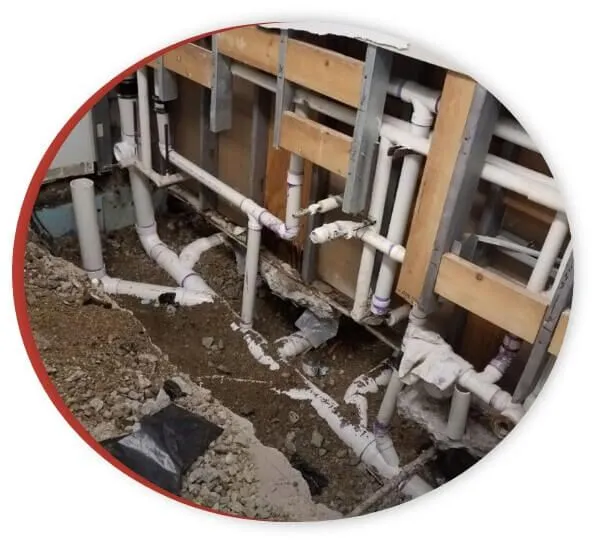As winter approaches, our homes transform. We swap out our summer wardrobes for cozy sweaters, fire up the heaters, and savor steaming mugs of hot cocoa. However, amidst all this, there’s one aspect we often overlook – our drains. Winter can be particularly harsh on your plumbing, leading to a host of issues that could turn your season from merry to messy.
In this article, we’ll explore the importance of drain care and provide you with five tips to keep your drains trouble-free during the winter months.

Understanding the Winter Drain Challenge
Winter weather can wreak havoc on your drains. As freezing temperatures drop, water within your drain pipes can freeze and expand, potentially leading to costly damage. Moreover, snow, ice, and debris can accumulate in your gutters and drains, causing blockages and impeding the flow of water. To maintain a smoothly functioning plumbing system, proactive care like DIY or professional drain cleaning services are essential.
In cold weather, several common problems can arise:
- Frozen Pipes: The most dreaded issue during winter. Frozen pipes can burst, leading to water damage and expensive repairs.
- Blockages: Accumulated snow and ice can block your gutters and downspouts, causing water to back up.
- Slow Drainage: Cold weather can slow down the flow of water through your pipes, leading to backups in sinks and toilets.
- Excess Grease Buildup: Holiday cooking can lead to an increase in fats, oils, and grease (FOG) going down the drain, which can solidify and clog pipes.
- General Wear and Tear: Cold temperatures can exacerbate existing plumbing issues, making it crucial to address them promptly.
Tip 1: Regular Cleaning
Maintaining clean drain lines is a year-round essential, but it becomes especially crucial in winter. Regular cleaning prevents debris and sediment buildup, reducing the risk of clogs and slow drainage. Start by removing leaves, twigs, and other debris from your gutters and downspouts.
Use a sturdy ladder and gloves to clean out your gutters and downspouts. Ensure that water can freely flow through them. For indoor drains, use drain snakes or environmentally friendly drain cleaners to eliminate clogs.
Exercise caution when cleaning gutters at heights. Always use a stable ladder and consider enlisting professional help if needed. When using drainage system cleaners, follow the manufacturer’s instructions and consider eco-friendly alternatives to protect the environment.
Tip 2: Insulate Exposed Pipes
Insulating exposed pipes is a proactive measure to prevent them from freezing. Frozen pipes can lead to pricey repairs, so it’s best to avoid the problem altogether. Insulation helps maintain a consistent temperature in the plumbing, reducing the risk of freezing.
Wrap exposed pipes in foam insulation sleeves or use heat tape. Pay special attention to pipes in unheated areas like basements and attics. These areas are more vulnerable to freezing.
While investing in pipe insulation may seem like an additional expense, it’s a cost-effective way to safeguard your plumbing. The money you save on preventing burst pipes far outweighs the cost of insulation.
Tip 3: Prevent Frozen Pipes
Frozen pipes can result in extensive water damage and burst pipes. The repair costs can be excessive, and the inconvenience is substantial. Preventing frozen pipes is key to a trouble-free winter.
- Keep your home warm. Insulate attics, crawl spaces, and walls.
- Allow your faucets to drip slowly to keep water moving.
- Open the cabinet doors to let warm air reach pipes under sinks.
- Disconnect outdoor hoses and shut off outdoor water valves.
If you suspect frozen pipes, turn off your supply of water and use a gentle heat source like a hairdryer to thaw the pipes. Never use an open flame, as it can be dangerous.
Tip 4: Proper Disposal of Fats, Oils, and Grease (FOG)
The holiday season often means more cooking and more cooking means more fats, oils, and grease going down the drain. FOG can solidify in your pipes and create stubborn blockages.
Instead of pouring FOG down the drain, collect it in a container, allow it to solidify, and then throw it in the trash. Alternatively, check if your local recycling center accepts used cooking oil.
Many cities have recycling programs for used cooking oil. If your area offers this service, take advantage of it. You can also look for local collection events where you can give your used oil for recycling.
Tip 5: Schedule Professional Inspections
While DIY maintenance is essential, scheduling professional inspections before winter can save you from unforeseen plumbing disasters. Professional plumbers can identify and address issues that may not be evident to homeowners.
Plan your plumbing inspection in the fall, well before winter’s chill sets in. This gives you time to address any concerns. Search for licensed, experienced plumbers and book appointments early, as their schedules tend to fill up quickly during the pre-winter season.
Knowing that your plumbing has been professionally inspected and is in good shape provides peace of mind throughout the winter. It’s an investment in the longevity and reliability of your plumbing system.
Protect Your Home Against Frozen Outdoor Drains
In the midst of winter’s beauty, it’s easy to forget the potential challenges it poses to our homes. By following these five winter drain care tips, you can ensure a trouble-free season. From regular cleaning and insulating pipes to preventing frozen pipes, proper FOG disposal, and professional inspections, each step plays a vital role in keeping your plumbing running smoothly. Don’t let winter catch you off guard; be prepared, and enjoy the season to the fullest.
 World inside pictures Collect and share the best ideas that make our life easier
World inside pictures Collect and share the best ideas that make our life easier







